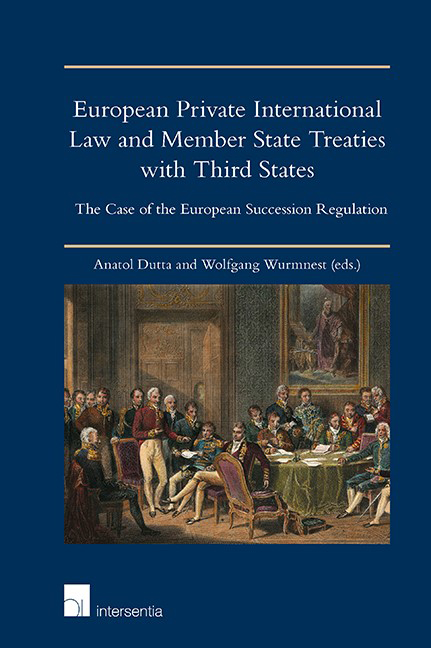 European Private International Law and Member State Treaties with Third States
European Private International Law and Member State Treaties with Third States Book contents
- Frontmatter
- Foreword
- Contents
- List of Treaties and Conventions
- List of Abbreviations
- List of Contributors
- Introduction
- Questionnaire
- PART I THE PERSPECTIVE OF EU MEMBER STATES
- Austria
- Belgium
- Croatia
- Czech Republic
- Finland and Sweden
- France
- Germany
- Italy
- PART II THE PERSPECTIVE OF THIRD STATES
- PART III THE PERSPECTIVE OF THE EUROPEAN UNION AND A COMPARATIVE OUTLOOK
- Annex
- Index
- About the Editors
France
from PART I - THE PERSPECTIVE OF EU MEMBER STATES
Published online by Cambridge University Press: 12 November 2019
- Frontmatter
- Foreword
- Contents
- List of Treaties and Conventions
- List of Abbreviations
- List of Contributors
- Introduction
- Questionnaire
- PART I THE PERSPECTIVE OF EU MEMBER STATES
- Austria
- Belgium
- Croatia
- Czech Republic
- Finland and Sweden
- France
- Germany
- Italy
- PART II THE PERSPECTIVE OF THIRD STATES
- PART III THE PERSPECTIVE OF THE EUROPEAN UNION AND A COMPARATIVE OUTLOOK
- Annex
- Index
- About the Editors
Summary
INTRODUCTION
Identifying the treaties between France and third States which, under Article 75(1) of the European Succession Regulation, prevail over the Regulation is a task significantly more challenging than it might seem. Only one example stands out, the Hague Convention of 5 October 1961 on the Conflicts of Laws Relating to the Form of Testamentary Dispositions, but the case of this particular instrument is envisioned in the second part of Article 75(1). It can accordingly be excluded from this survey.
France is a party to the 1973 Washington Convention providing a Uniform Law on the Form of an International Will, but, as the name suggests, this convention does not contain choice-of-law rules, but rather a third model for testaments which has taken its place in substantive French law beside the holograph and notarial wills. It need not be addressed, nor do the various consular treaties which contain neither choice-of-law rules nor rules on jurisdiction. Similarly, the innumerable bilateral treaties on judicial cooperation which frequently cover recognition and enforcement of foreign judgments cannot interfere with the Regulation and will thus not be discussed.
Beyond these examples, the search for treaties that could be relevant is a process that almost irresistibly evokes a fumble in the dark. Nothing is mentioned, as far as France is concerned, in the Regulation commentaries as regards Article 75, not even in those that are written in French. The books or articles written with practitioners in mind are equally silent. This should perhaps not come as a surprise since, in the field of private international family law, the treaties France is party to do not cover succession matters.
Only one author has recently – albeit in a context unrelated to the European Succession Regulation – flagged international instruments that could perhaps be relevant. But whether they actually are relevant is far from clear. The main difficulty, which is addressed in the next section (section 2), stems from the fact that these treaties do not refer specifically to succession matters, but to what is known in French private international law as statut personnel, a pivotal concept which in the present context gives rise to considerable uncertainty.
- Type
- Chapter
- Information
- European Private International Law and Member State Treaties with Third StatesThe Case of the European Succession Regulation, pp. 141 - 148Publisher: IntersentiaPrint publication year: 2019
